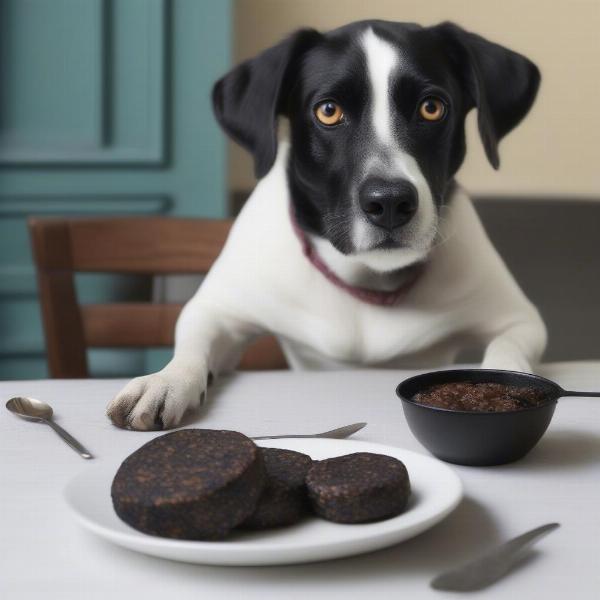Black pudding, a rich, savory blood sausage, is a breakfast staple for many people. But is this iron-rich food safe for our canine companions? The short answer is no, black pudding should not be fed to dogs. While a small amount might not cause immediate harm, it’s not a healthy or recommended treat. This article will delve into the reasons why black pudding is not good for dogs and explore healthier alternatives.
Why Black Pudding is Not Recommended for Dogs
Black pudding is typically made with pig’s blood, fat, onions, and various seasonings. Several ingredients in this mix can pose problems for dogs. The high fat content can lead to pancreatitis, a painful and potentially life-threatening inflammation of the pancreas. Onions, both raw and cooked, are toxic to dogs and can damage their red blood cells, leading to anemia. Additionally, the spices and seasonings used in black pudding can upset a dog’s stomach and cause digestive issues like vomiting and diarrhea.
 Dog looking longingly at a plate of black pudding
Dog looking longingly at a plate of black pudding
The Dangers of High Fat and Onion Toxicity in Dogs
While fat is a necessary part of a dog’s diet, too much can be harmful. Pancreatitis, caused by excessive fat intake, can result in symptoms such as vomiting, lethargy, abdominal pain, and loss of appetite. Onion toxicity, while often associated with larger quantities, can also accumulate over time with repeated small exposures. The sulfoxides and disulfides in onions disrupt a dog’s red blood cells, leading to hemolytic anemia. This can cause symptoms like weakness, pale gums, rapid breathing, and even collapse.
Healthy Alternatives to Black Pudding for Dogs
Instead of offering your dog black pudding, choose healthy treats specifically designed for canine consumption. Dog treats low in fat and made with wholesome ingredients are a much better option. Consider offering small pieces of cooked lean meat like chicken or beef, or dog-friendly fruits and vegetables like carrots or apples (remove seeds and core). Always consult with your veterinarian before introducing new foods into your dog’s diet.
What to Do if Your Dog Eats Black Pudding
If your dog accidentally ingests a small amount of black pudding, monitor them closely for any signs of digestive upset or illness. Watch for vomiting, diarrhea, lethargy, or loss of appetite. If your dog exhibits any of these symptoms, or if they ate a large amount of black pudding, contact your veterinarian immediately.
Conclusion
While black pudding might be a tempting treat to share with your furry friend, it’s simply not worth the risk. The high fat content, onions, and seasonings can cause a range of health problems, from mild digestive upset to serious conditions like pancreatitis and anemia. Opt for healthy, dog-specific treats and foods to ensure your dog stays happy and healthy.
FAQ
- Can dogs have a little bit of black pudding? No, it’s best to avoid giving your dog black pudding altogether.
- What are the signs of onion toxicity in dogs? Signs include weakness, pale gums, rapid breathing, and potentially collapse.
- What should I do if my dog eats onions? Contact your veterinarian immediately.
- What are some safe treats for dogs? Look for low-fat treats made with wholesome ingredients, or offer small pieces of cooked lean meat, carrots, or apples (without seeds and core).
- Is black pudding good for any animals? While some humans enjoy it, it’s not recommended for dogs and many other pets.
- What is the main reason black pudding is bad for dogs? The combination of high fat, onions, and spices makes it unsuitable for canine digestion.
- Are there any exceptions to this rule? No, there are no exceptions. Black pudding should not be given to dogs.
About ILM Dog
ILM Dog (https://ilmdog.com) is your trusted resource for all things dog-related. We provide expert advice on dog breeds, health, training, nutrition, and much more. From puppy care to senior dog support, we’re here to help you navigate every stage of your dog’s life. For personalized advice on dog nutrition and dietary needs, reach out to our team of experts. Email us at [email protected] or call us at +44 20-3965-8624.